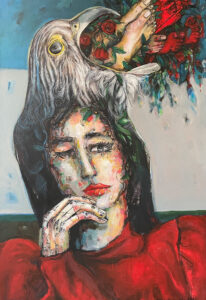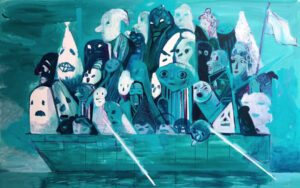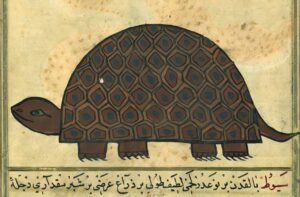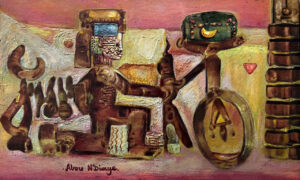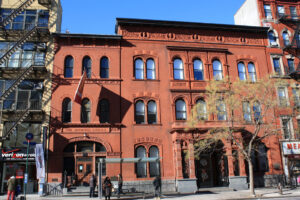Negotiating the secret byways of Beirut, a cousin helps a cousin achieve his heart’s greatest desire — for a price.
It seemed to Malek that no Sunday afternoon could be as boring as this one. His grandma, Anbara, smoked her Ajami argileh blowing the fumes, circle by circle, over the skyline of Beirut. On her lap was a plush maroon pillow with crystals dangling from its seams — a throne often reserved for her cat, Antar. Today, the throne played host for a tray of Turkish coffee, which she drank Wasat with medium sweetness. Whenever Anbara smoked, she directed her attention to a person near her, fixed her gaze and retrieved an insult framed as a memory.
She watched Malek and said, “When I sent your mom to the American Evangelical School, only the daughters of the high high and the diplomats went there. And this is how she’s repaying me. Chopping her weight in parsley!”
Malek laughed and said, “An American education for tabouleh!”
Nadine feigned a smile buried between unsaid “uffs,” threw the yellow and wrinkled parsley stalks into a crystal bowl and said, “Mama you nag and complain about my life, but you’re the first to jump on my food.”
Anbara inhaled a strong puff from her argileh, gurgling the water and exhaled back into Beirut. “I don’t blame you Nadine, I blame your husband,” she said. “He’s the one who made you give up your job at the Japanese embassy. You could have been living in Tokyo speaking Japanese and eating sushi, maybe even a handsome second husband from Japan. Who knows …” she added, raising her voice so Zahi could hear her — Zahi sat on the far edge of the balcony in a comfortable distance formed of pots filled with za’atar, oregano, and maryamieh plants and a night blooming jasmine, which they bought from a man’s van on the side of the road, while driving down from Gharifeh. Nadine always named the flowers after their sellers. “And you’re called Nader,” she said to the night blooming jasmine, placing her next to Georges and Fareed.
Nader announced it was sunset through tiny white flowers blooming across his torso, filling the balcony with a potent and sweet aroma and for a brief moment everyone receded into stillness, inhaling his dark florals. Sunset was Maghreb and it was when the day began for Zahi, welcoming it through reciting the most beautiful names of God on his masbaha, moving each rosary bead in harmony with his mouth, his eyes fixed on the water, a trance until the 99 names were served in deep reverence. Anbara loved to poke fun at Zahi’s rituals, knowing he does not break into conversation no matter what. “Come meditate on some shisha,” she yelled from across the western border of the balcony. Zahi did not reply, but he said a few of the names of God out loud, “The Delayer, The First, The Last, The Manifest,” to indicate that he is near his end. When Zahi finished, he opened his eyes, returned to the world of the balcony and sensed his son’s boredom. “Why don’t you go to Rabea’s Roastery and buy us some Kri Kri and drinks. Your siblings will be coming in an hour or so,” he said to Malek, removing 20,000 liras from his wallet. Malek agreed and went to his room to get ready. Going to the roastery was an affair that his mother did not let pass through casual clothes. “You dress for the grocer like you dress for a night out,” Nadine would say. In the room, the phone rang on the handy, Malek often avoided answering knowing that on Sunday it would either be his aunt asking for money or his uncle from Paris saying he needs Zahi to pray for his “troubled children.” But today, a phone call was the most exciting event. He picked up, adjusted his voice and said: Alo Marhaba.
“Malouk, is that you?” someone asked.
Malek’s jaw danced with excitement, realizing it was his favorite cousin Anas and said, “Habibi, how are you?”
“Meshta’lak Meshta’lak Meshta’lak,” Anas said.
“I miss you more. What brings the pleasure of this call?” Malek said.
“Well, you know it’s my 18th birthday in a few days. And I have a favor to ask of you,” Anas replied.
“Anything for you, especially on your birthday. Do you want me to come down to Damascus?” Malek said.
“No, actually I will come to Beirut on Wednesday morning and the rest of the family might join on the weekend. We will stay at the Mediterranée Hotel. But don’t tell anyone it’s a surprise,” Anas said.
“Thank God you’re coming, I’m so bored in this retirement home. Bas, why are you traveling alone?” Malek asked.
“Listen I have an urge I need to satisfy. And what better than Beirut to scratch my nail?” Anas asked.
“Ma fhemet. What do you mean?” Malek said.
“Uff Malek. You are always so lost. I want to fuck. And I can’t fuck in Syria! Everyone knows who I am so I am coming to Beirut,” Anas said with a hushed voice.
Malek moved the handy away from his right ear and said to himself, “He wants to fuck?” He stayed quiet for a minute and said, “Anas what do I know about sex? I’m sixteen. If you want, I can book you a nice dinner at the Lamb House and we can have some escalope and wine. But more than that I can’t!”
Anas laughed and said, “Malouk, you pretend you don’t know but somehow you find a way. There is a saying in Damascus that every neighborhood has a pimp and a grocer. Please Malek I will do whatever you want in return. Find this pimp.”
Malek, not one to give up a business deal, accepted and said, “Okay. I will do this favor for you and on my 18th birthday you will give me your car.”
“The Porsche? Malek come on ask for something else,” Anas said with a disparate tone.
“Take it or leave it,” Malek said.
“Fine, it’s yours. Wallah its yours,” Anas said.
Malek smiled a smile larger than the setting sun and said, “See you on Wednesday.”
In the morning, Malek woke up to a bouquet of sickly-sweet smells. He walked to the kitchen and found his mother and grandma arranging away as if half a day had already passed. “It’s still eight a.m., why are you cooking so early?” he said. Nadine opened the cupboard, retrieving a bag of Abido’s seven spice powder and added a tablespoon of it to the pot. “I’m making moghleh for my book club party tonight. It’s summer and we need some pudding,” Nadine said. “There’s za’atar and toast for you on the table.” Anbara lifted her chin from her throne, housing hundred-thousand lira bills, and said, “You made me lose count. I think we’re now at five million liras.”
“Who’s this money for?” Malek asked.
“For your mother’s book club. Maybe if they end up dancing, I’ll throw some money at them. Nadine and her friends need to shake more,” Anbara said.
“Mama, please go to the Palace Café tonight after giving the money to the mosque and give me and my friends a break,” Nadine said.
Malek sat at the dining table reserved for the morning and faced the window near the parking. He sipped his coffee and drifted from his family’s matriarchs with only one loud thought in his mind asking: Where can Anas fuck? He conjured up Beirut’s streets, maybe the Mawada Cinema in Tariq Jdideh, next to the Karakeh where he got roast beef sandwiches, he often saw men lurking there staring at pornographic posters outside its doors. But no, Anas will not accept to go there and be in company with old men. Plus, it’s too riffraff for his taste. Oh, maybe Hamam Al-Saada, Malek thought to himself. Yes, he remembered when he hid from the rain at the café of the Bristol Hotel, he heard a man in the gray raincoat say, “Oh he gave me a great soapy rubdown.” No, Anas doesn’t want a he!
Malek awoke from his hypnotic state to his grandma saying, “Oh, did I tell you? Fatmeh called my sister. We finally know where she is. Two years later,” Anbara said. Fatmeh was Fay’s nurse, caring for her in between her bouts of epilepsy. She eloped with a man from Saida, never to be heard from again, an affair no one cared about, except the inhabitants of the Sultan Building who lived and breathed scandal.
“Wallah? Where is she?” Nadine asked.
“She is working with her miserly husband at Casino Farid Al Atrach. She cooks up the mezza and he manages the finances of the place,” Anbara said. “I would run away from Fay to that too. At least it’s a cooler job,” Malek said. “Skot! This is not a conversation for children,” Anbara said.
“How is the casino still open? I thought it went bankrupt?” Nadine asked, adding peeled almonds to the Mughleh.
“Well, you are not going to believe this. Apparently, the casino has become a place for Filipino migrants in Beirut. They go there after church on Sunday and the casino begins a wild party from noon till evening. Fatmeh told me they make so much money on Sundays they don’t open for half of the week,” Anbara said.
“Wow where is this casino, Teta?” Malek asked. “Why do you want to go there and party with them?” Anbara replied, her shoulders shaking with laughter. “It’s behind Future Television,” his mother answered. “Malek this area was …” Anbara said and Malek’s stomach filled with the dread of knowing it was time for another ruinous Beirut tale. Anbara put her throne on the ground allowing Antar to return to it and continued, “Where the casino now stands, was an area full of villas with the most dazzling gardens. Large orchards, standing like sturdy men, guarding the streets from the sun, so whenever you walked in between their alleys there was a gentle breeze inviting you in. You had the Rose House, well they were the first to import chandeliers from Italy, so many crystals shone in their living room, the Light House attendant would call them and say, ‘You’re disrupting my vision!’” Anbara said with a melancholic laugh. “Tell him about Abu Jamil’s villa,” Nadine said. “Malek, his villa was like no other, you would think you are in the Amazon Forest. He was the first to plant avocado trees in Beirut after moving back from Abidjan. We always left his house with bags and bags of fruits and vegetables, but he was a thief, may he rest in peace, nothing passed through the port of Beirut without paying him a gentlemen’s fee,” Anbara said, “back then, the houses sat next to the sea, a continuation of Beirut’s water. Not like the nouveau riche now, who just want to enjoy the sea from beige towers!”
“What happened to the villas, Teta?” Malek asked.
“Now? Well just like the casino, the streets swallowed up the chandeliers and the avocado, hosting wicked men and dancing women instead,” Anbara said. Malek stood up, thrilled that the story carried an answer with it and he knew he had to follow the trail of dancing women.
At noon, Malek was outside of Future Television. He spotted an empty parking lot behind the building and walked through it. A man sitting on a swivel chair, stopped him and asked, “Where are you going?” His mouth was so large it appeared as if he spoke only from its left corner, the voice crawling from the inner caves of his belly.
“Casino Farid Al Atrach,” Malek said, adjusting his voice to a more masculine tone. The man maneuvered his eyes into perplexment, and said “How old are you? You seem too young to get it up.” Malek, offended, replied “Can you even find it in between your stomach layers?” The man broke into explosive laughter, shaking the ground of the parking until he arrived to a smoke-filled cough. “There,” he said, pointing a finger to a jagged alleyway. “Shukran,” Malek said in a politeness reserved for school principles. He walked through the alleyway riddled with shattered Almaza bottles, wrapping paper beiged with the olive oil of this morning’s za’atar manakeesh and a few flattened Pepsi cans. He arrived at a large wooden door tucked between four metal rods and over the door was a poster of two blonde women jet skiing around the Pigeon Rocks. They glanced down at Malek with severe smiles and in between their torsos hovered the phrase: Beirut, City of the World. He put his right hand through the rods and buzzed a green bell. “Yalla,” said a voice from the inside. The door opened and Fatmeh appeared in front of Malek. Shocked, she yelled “Yiy” and maneuvered her yellow hijab across her face, attempting to close the door.
“Fatmeh, don’t worry no one knows I’m here. Please I need help,” Malek said.
“Malek, leave right now. This is not a place for kids. If your grandma finds out you’re here, she will hang me on Ramlet El Bayda beach,” she said.
“She won’t find out,” he replied, as he passed a bag between the door. “This is for you, a small gift. Teta got mountains of Ajami tobacco from her dealer in Turkey she won’t notice a few are gone,” Malek said, proceeding to wear a transactional smile. Enamored with the harsh smell of the tobacco laced with a honeyed sweetness, Fatmeh conceded. “Okay be quick, but I will not open the door, this is not a place for kids,” she repeated.
“Anas, my cousin. You know him the one who always eats muhamara for breakfast. He’s coming to Beirut and wants a woman to spend the night with,” Malek said.
“A’oodhu billah! You have lost your mind, Malek. Why would you think I can help with that?” she said.
“I don’t mean you Fatmeh! But I heard Teta saying you work with dancing women. Maybe one of them can entertain Anas,” Malek replied.
“I can leave your grandma’s house but I can never leave her tongue,” Fatmeh said. “Listen Malek, as long as I live you will not step foot into this casino. But I know a place you can go, Al Bustan bar. It’s down the road from here in an alley behind the Duroy hotel. Ask for Tony, he should be able to help,” Fatmeh said.
“Fatmeh, you always know what to do,” Malek said as he shook the metal bars.
“Yalla leave,” she said, shooing him away with her hand. Fatmeh closed the door, opened the bag, smelled the tobacco until it arrived inside her throat and said: it’s a rich night, tonight.
Malek went back through the parking to the attention of the man on the swivel chair who devoured a falafel sandwich with enormous passion. He mouthed his tahini drenched lips and said, “Shu? You did not find someone your age?”
Malek looked at him and said, “No, I didn’t, they said you ate them.”
“Ya akrout,” the man yelled, beating his right leg to the ground, vomiting out a tirade of cuss words.
Malek stepped out to Beirut and saw the sign of the Duroy Hotel, he walked towards it, examining the surroundings, until he found another alley, this one covered with a puddle of sewage water, causing him to tiptoe across it, guarding all corners of his new shoes. He arrived at another door, a wooden one with “Al Bustan” painted in red on its center. He knocked on the door with his pounding heart until a man wearing a checkered shirt, unbuttoned to its middle, opened and said, “Who are you?”
Malek, speaking to the man’s chest hair, black and curly, asked “Are you Tony?”
“Yes, why?” he replied.
“Fatmeh sent me over. She said you can help. See my cousin is coming …” Malek said only to be shooshed by the man who put his fingers on Malek’s mouth. “I don’t want the back story. Can he pay in dollars?” Tony asked. “Yes, he can,” Malek confirmed. “Be back here at 5:00 p.m. tomorrow. And don’t wear shorts. This is a respectable place,” the man said.
Malek nodded.
Back home, Malek rushed to his room, picked up the handy, electrified with the news he was about to deliver, and called Anas. “I found you someone, but you have to be here tomorrow afternoon,” Malek said. “I knew you could do it. I knew it. See you tomorrow,” Anas said.
At 4:00 p.m., Malek waited for Anas outside of the Tabsh gas station and when he saw the black Porsche Cayenne rolling through, he beamed with the knowledge of this being his future property. The gas station attendees huddled around the car — tantalized — and each offered a service through their gestures. Ramzi moved his arms up pretending to wipe the Porsche’s windshields and Tareq put his hand next to his crotch and maneuvered it with the offer of hosing it down to clean. “Khalas shabeb,” Malek said, thanking them and asking them to leave. Anas opened his window, he wore dark-framed Ray-Ban sunglasses and a black shirt so tight it attempted to mold his thin arms into biceps. Malek sat next to him, released an asthmatic breath and said, “Here we go.”
“Nice pants,” Anas said, slamming Malek’s left thigh.
“No shorts according to Tony. Listen Anas, we can’t have alcohol at that dungeon. I remember seeing on TV in America, people don’t drink in such places, they drug them. I won’t be drugged in Rouche out of all places,” Malek said.
Anas laughed as he backed out of the gas station and said, “You worry too much.”
“What will you do there anyways? You know how to do it?” Malek asked.
“Habibi, I will do everything. Well except anal. My theology teacher said this is a big no for us,” Anas said.
When they arrived, Malek walked with ease in the alley which was now cleaner and he knocked on the door, taking Anas’ sunglasses off while they waited. “You look like an idiot,” he said. Tony emerged, this time wearing a green Ralph Lauren polo shirt. “Punctual like bankers,” he said. “The girls are not ready, but you can come in and have a drink,” he said. Malek and Anas walked in to a dimly-lit world and sat on two bar stools. There was a crystal vase with four red paper roses inside of it and next to it burning incense which filled the room with a resinous aroma. Tony went behind the bar, standing under the frame of a woman in a white dress, pearls on her ears, and hair so coiffed you could smell the spray that held it together. “My mother,” Tony said. “Allah Yerhama, this place was hers during the war. She was Lebanon’s master florist. So famous was she people came from all over Lebanon for her works of art. At some point even President Chamoun arranged the palace’s bouquets here,” he said pointing his finger to the wall behind them, a hall of bygone politicians and singers. “She died and I wanted to keep the place, but this is the only way to do it. Flowers don’t bring as much money anymore. But my mom sold pleasure, so now I continue it in my own way,” he said, placing two glasses on coasters in front of them. “Two vodkas for the gentlemen,” he said. “Oh no, its okay. We will just have Pepsi,” Malek said with the care of a mother. Anas laughed and Tony joined him as they both said: relax. “Well, the girls will be ready in a few minutes. But you need to pay in advance. Four hundred dollars for thirty minutes with two of Beirut’s pearls,” Tony said.
“It’s just one girl. For Anas only. I won’t be doing anything,” Malek lashed out.
“Rules are rules,” Tony said.
“It’s fine, Malek. Just sit and have coffee with her or something. You never know maybe she’s your type,” Anas said, handing the man a stack of dollars wrapped in a rubber band.
“She’s definitely not my type,” Malek said with a strict affirmation. Tony grabbed the money, opened the register and gave them an invoice.
“What’s this?” Malek asked. “An invoice for two dozen floral arrangements for a wedding at the Royal Plaza Hotel next door,” he said, “you know in case anyone stops you when you leave.”
Tony stood in the middle of the room and said, “Boys this is a respectable place of business. No videos, no role play, no tying or hanging. You do what you need to do and leave in peace, okay?”
“Yes Tony,” Malek and Anas said.
Tony turned back and yelled, “Oh pearls,” and in that moment Malek grew in coolness thinking that suddenly life was not that dull Kri Kri suburbia of nightmares and that a Kylie Minogue video was about to become their reality, until one of the pearls emerged, a body so round and gargantuan in size, and blonde hair so ashy it resembled a burnt wig. Malek horrified, inched closer to his cousin and said, “Oh my God, is this Ursula from The Little Mermaid.”
“She’s the one I want. She can hide and squeeze me inside every corner of her body,” Anas said, his eyes morphing into a seduced rapture. He walked up to her, kissed her right hand and said: “And what’s your name, beautiful?” “Double Apple,” she replied, moving her hands across her chest and attempting a coy and girlish sound that harbored within it a greater more terrifying voice. Double Apple had a grin that anticipated Anas’ easy money and Malek who still could not believe this was his cousin’s fleshy desire, froze over his stool. He avoided staring directly at the other worker, who was younger with black hair, hazel eyes and a body so thin it made Malek hungry. She wore a denim mini skirt and had an air about her that smelled like orange blossom. She got closer to Malek and put her right hand on his back causing the hairs on his arms to rise and said, “I’m Amany.” Malek turned back and said, “Do you want my drink?”
“Generous man,” Amany said, acknowledging Tony who gave her a nod indicating she could have the vodka. “Let’s move to the table and get comfortable,” she said prompting Malek to walk to the one closer to the curtains. “I will go outside and smoke,” Tony said.
Alone, they sat next to the hall of bygone celebrities, Amany lit up a cigarette, examined Malek up and down, and said, “Shu, you want a blow job?”
“No, no. Khalas we paid and you will get your money,” Malek said, pulling out the invoice. “But nothing for me, it’s just for him inside,” he said as an orchestra of moaning and grunting played behind them.
Amany, unbothered, replied with, “Hmm okay,” disabling the seductive eye contact she attempted to perform.
“Well, it’s an interesting job. Why do you do it?” Malek asked with his hands on his lap as if he was the one being interviewed.
Amany, surprised with his question, pointed with her diamond-encrusted fingers to Malek’s iPhone and said, “I’m saving up for this and some other stuff.”
“Aha I see. And after the phone? What’s next?” Malek asked. Amany was about to answer but Double Apple’s voice came in between them while she yelled: “Kneel and tell me I’m the best argileh you ever smoked.”
“You are, you are, the sweetest tobacco in town,” Anas repeated with willful surrender.
“I didn’t say you can get up, little boy,” she yelled.
“I’m sorry Double Apple,” Anas said.
Malek disturbed by the images he was receiving went silent for a minute. “Double Apple has a strong tongue in and outside of bed,” Amany commented, realizing his discomfort, “but you know Lebanese men love to be dominated. Oh, if I tell you about these guys, bankers, truck drivers, doctors, they all come for Double Apple to command them.”
“Why do you think they like that?” Malek asked.
“Everyone in this city is punishing someone else and sometimes they just want to be punished. So here comes Double Apple and she disciplines them with so much love that their lips tremble aching for more,” Amany said.
“And you what’s your style?” Malek asked.
“I’m more the mistress, the one you buy the expensive perfume reserved for the high-class women. Dior from ABC Achrafieh,” Amany said, sipping a bit more of her vodka.
Double Apple and Anas continued to divulge their innermost carnal sounds, Malek attempting to ignore it until he picked up on these melodies of happiness in his cousin’s voice, which turned a bit feminine as he grew in joy and he imagined that back in that shitty room, which smelled like Dettol, he was like Nader with the night jasmine blooming across his torso.
Amany went to the bar to pour another drink and said, “Oh I forgot to tell you. I won’t do this forever. I am waiting for a green card. My fiancée lives in Detroit, inshallah, I will move there.”
“I always wanted to go to America,” Malek said.
“Me too. My plan is to open a nail salon there,” Amany replied.
A short while later Anas appeared from behind the beaded curtains, his pants down to his legs, his hairy and scrawny thighs still shaking. He lifted his pants up with his jolted smile. “Shu, you’re done?” Malek asked. “Eh, khalas,” Anas said with a reverie asking to be revealed across his face.
Malek bid farewell to Amany, “I hope you make it to Detroit,” he said. He then yanked Anas by the arm and when they stepped back out to Beirut, they found Tony sitting outside eating a shawarma sandwich. “Again, on time like bankers,” he said. They nodded and walked away, not wanting to acknowledge much more of the parts of them that were revealed inside.
As they left, Malek stood in front of Anas and said, “Never again. Next time you want to fuck, you do it on your own.” “Oh, come on, I am sure you had some fun, Malouk!” Anas said, ruffling Malek’s hair. “Her body was like a malahy, a huge theme park,” he said, “I played with it until I used my last and biggest voucher. At the end it felt like a river passed between my legs.” Malek shook his head and said, “Khalas, I don’t want to hear more of you and Ursula. Yalla, you owe me a fancy dinner.” They walked up to the restaurant on the ground floor of the Duroy Hotel, sitting at a terrace with a narrow view of the water, tucked within the past of the former villas, the dead orchards, the manic light house attendant and shattered chandelier glass. A waiter took their order, kibbeh, tabouleh, hummus, batata harra, baba ghanouj, cheese rolls, fatayer, vine leaves, muhamara, seven up and kafta, but then Anas, who sat with legs wide open, called him back and said: “Oh, and one argileh.”
“What flavor?” the waiter asked.
“Double Apple,” Anas replied.



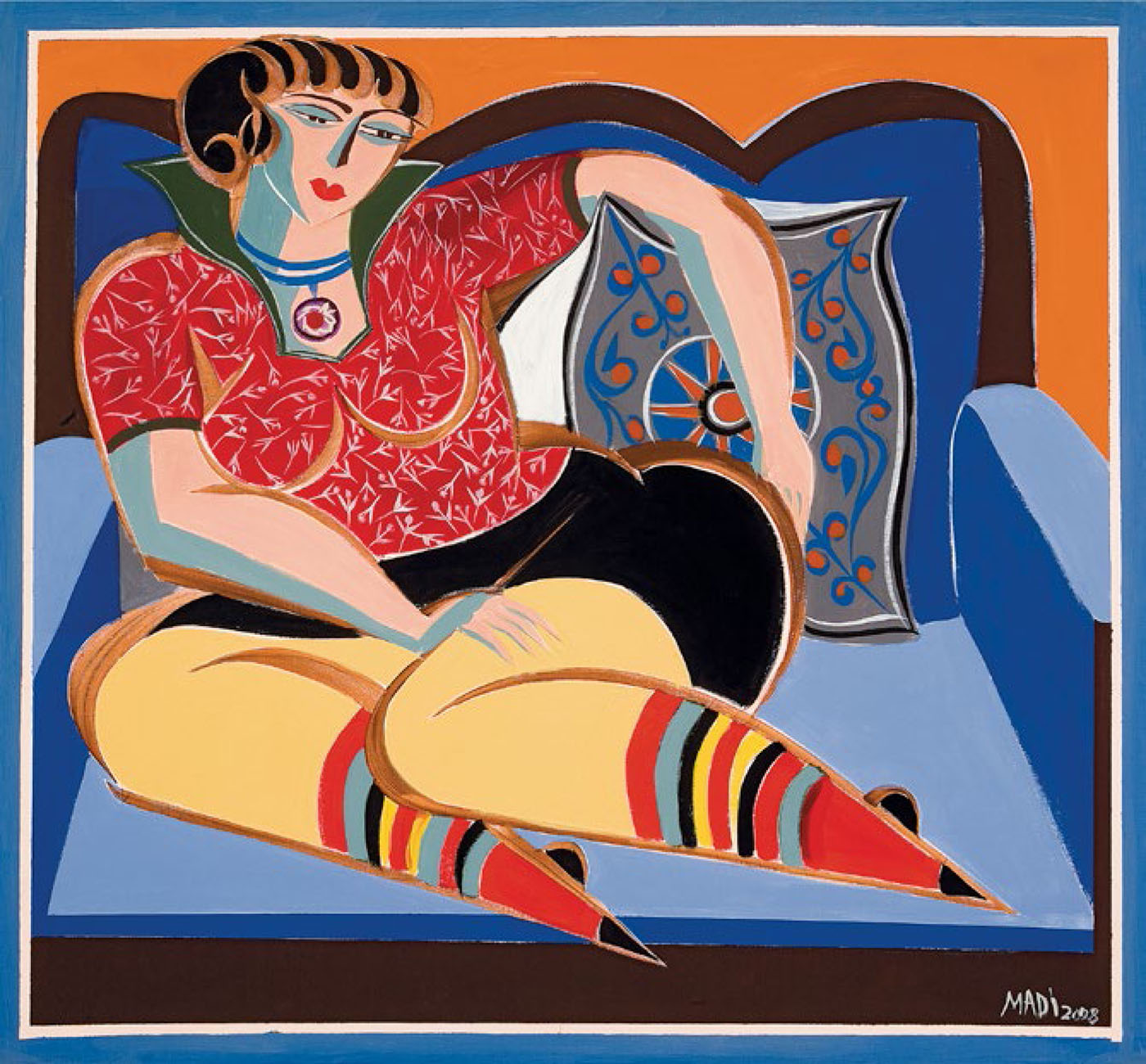
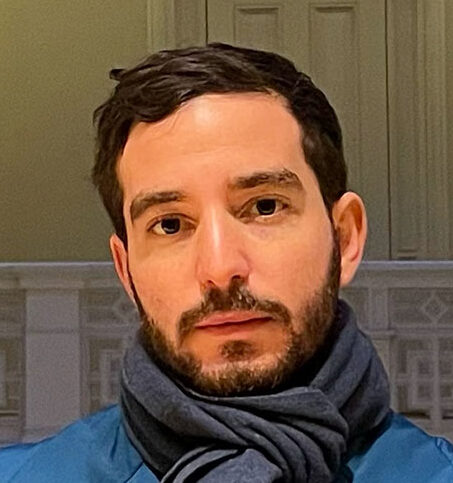






![Ali Cherri’s show at Marseille’s [mac] Is Watching You](https://themarkaz.org/wp-content/uploads/2025/09/Ali-Cherri-22Les-Veilleurs22-at-the-mac-Musee-dart-contemporain-de-Marseille-photo-Gregoire-Edouard-Ville-de-Marseille-300x200.jpg)















